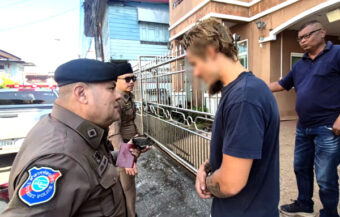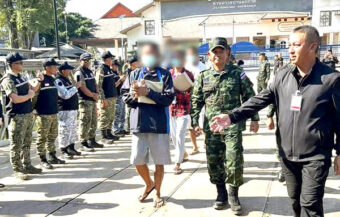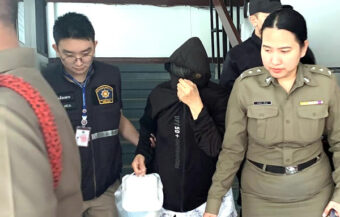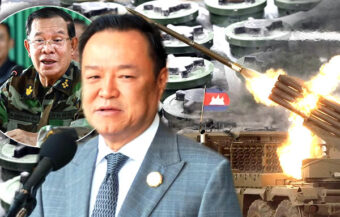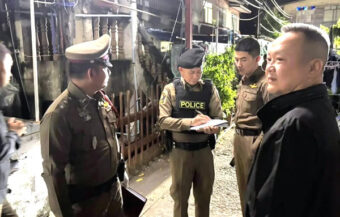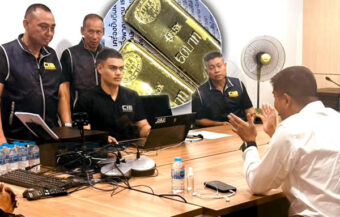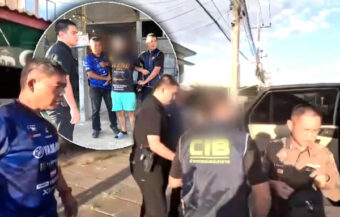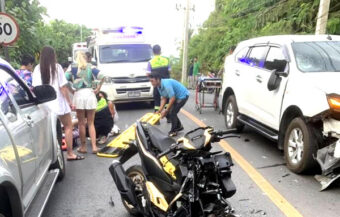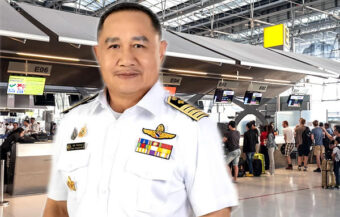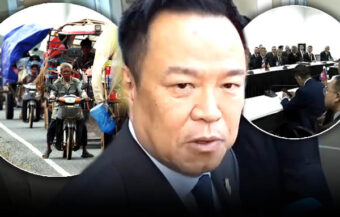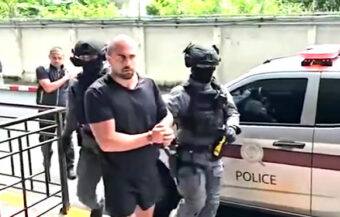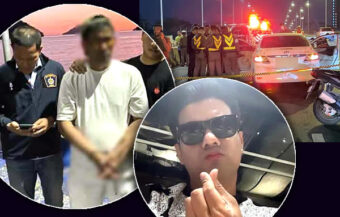Hun Sen’s blistering speech attacking Thailand’s leaders sparks fears of foreign meddling and a coup. Thai MPs and cybercrime chief warn his threats and fake news aim to destabilize democracy as protests loom, exposing deep political and regional tensions.
A Pheu Thai MP, Thailand’s top cybercrime cop and a firebrand People’s Party MP all sounded the alarm Friday after a furious tirade by Cambodia’s Hun Sen sent shockwaves across the border. Speaking to troops in Preah Vihear province, the ageing strongman launched a blistering attack on Thai Prime Minister Paetongtarn Shinawatra and her father, ex-PM Thaksin Shinawatra. His words were not just insulting—they were dripping with menace. Hun Sen, 72, didn’t just criticize—he seethed with contempt for Thailand’s young leader. His speech reeked of personal hatred and political sabotage. More dangerously, he appeared to throw his weight behind Thailand’s military and former Interior Minister Anutin Charnvirakul—painting them as victims of the Shinawatra dynasty.
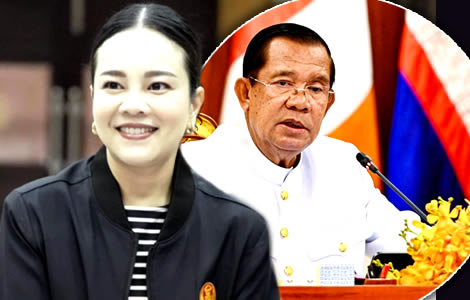
Pheu Thai MP Khattiya Sawatdiphon didn’t mince words. She called Hun Sen’s speech a thinly veiled call for a coup. Indeed, “This is foreign meddling at its worst,” she warned, accusing the Cambodian Senate president of trying to tear down Thai democracy.
Meanwhile, People’s Party MP Wiroj Lakkhanaadisorn backed her up. He slammed Hun Sen as a master manipulator stirring chaos for personal gain. In fact, his warning was clear: “This is calculated, not careless. And it’s dangerous.”
Thailand’s cybercrime chief, Police Lieutenant General Trairong Phiwpaen, hit back hard too. He branded Hun Sen’s claims as flat-out lies, saying the dictator was spreading fake news to deflect from Cambodia’s own problems. Moreover, “The real scam capital isn’t Thailand—it’s Cambodia,” he said. The message from all sides was clear: Hun Sen has crossed a line—and Thailand’s democracy may be the target.
Cambodian senate president’s speech seen as dangerous provocation aimed at destabilizing Thailand’s democracy
Pheu Thai MP Khattiya Sawatdiphon later accused Cambodian Senate President Hun Sen of inciting political instability in Thailand. In a blistering statement, she described Hun Sen’s recent speech as a dangerous provocation. More alarmingly, she called it a calculated attempt to trigger a coup d’état in Thailand.
Khattiya is no ordinary MP. She is the daughter of the late Major General Khattiya “Seh Daeng” Sawasdipol, a military leader killed during the Red Shirt protests in May 2010. His legacy looms large over Thailand’s modern political conflict. Now, fifteen years later, his daughter claims democracy is once again under threat—this time from outside Thailand’s borders.
Her comments followed a fiery, rambling speech by Hun Sen in Preah Vihear province, just across the Thai border. The Cambodian strongman addressed soldiers and the public this Friday, unleashing a barrage of attacks on Thailand’s leadership. His speech, more than an hour long, was translated and broadcast widely across both Cambodia and Thailand.
The timing of the speech raised eyebrows. It came just 24 hours before a major planned protest in Bangkok, scheduled for March 28 at Victory Monument. The protest had already drawn security concerns. But after Hun Sen’s remarks, the tone of alarm increased. Critics quickly connected the dots.
Khattiya calls Hun Sen’s speech outrageous interference that aims to incite unrest and weaken Thai sovereignty
In her press briefing, Khattiya said the Cambodian leader’s speech was not coincidental. “This is not just political noise,” she warned. “This is an outrageous, deliberate interference in our internal affairs.”
She went further. “Hun Sen is fanning flames in our house,” Khattiya said. “He acts like a thief, trying to steal Thai people’s rights.”
Her outrage reflected a broader national sentiment. Across Thailand’s political spectrum, Hun Sen’s speech was seen as an attack on Thai sovereignty. It wasn’t just rhetoric. It was personal. And it was calculated.
Notably, Hun Sen focused much of his venom on Prime Minister Paetongtarn Shinawatra. The 38-year-old PM, daughter of Thaksin Shinawatra, has sought to chart a new political course. But Hun Sen dismissed her as naïve and ungrateful. He accused her of currying favour during a private call on June 15.
“She tried to flatter me by insulting her own military,” Hun Sen claimed. “That’s treason in Cambodia.”
Hun Sen alleges Prime Minister’s call was treason and attacks Thaksin Shinawatra with grave accusations
According to Hun Sen, Paetongtarn criticized the commander of Thailand’s Second Army during their June 15 conversation. He said she did it to gain his sympathy. That allegation shocked many. However, the Prime Minister has not confirmed or denied the content of the call.
Meanwhile, Hun Sen didn’t stop there. Instead, he turned his attention to Thaksin Shinawatra, Paetongtarn’s father and Thailand’s controversial former Prime Minister.
“I met him after he left the hospital last year,” Hun Sen said. “He told me he wasn’t really sick.”
The Cambodian Senate President claimed Thaksin admitted to deceiving the Thai public about his health. Moreover, Hun Sen even hinted he possessed damning evidence of lèse-majesté. That is a grave charge in Thailand, where royal defamation is a criminal offence. He threatened to release that information if provoked further.
Furthermore, Hun Sen attacked the Thai government’s move to sideline former Deputy Prime Minister Anutin Charnvirakul. According to him, Thaksin told him about the plan in confidence.
“I warned him not to fire Anutin,” Hun Sen said. “But he didn’t listen. Now he must face the consequences.”
Hun Sen’s claims hint at insider knowledge of political rifts and fuel rumours of coalition tensions in Thailand
The statement surprised many observers. While Anutin has faced political setbacks, his dismissal from key posts sparked rumours of factional tension within the ruling coalition. Hun Sen’s comments appear to confirm those internal disputes—and suggest he was informed in advance.
In addition to political attacks, Hun Sen launched economic and reputational broadsides. He denied that Cambodia is a base for scam operations, as widely reported. Instead, he claimed Thailand was the true hub of Southeast Asian cybercrime.
“Look at your own airports,” Hun Sen said. “Your country is the entry point for all online scammers.”
Yet that claim was quickly rebuked by Thailand’s cybercrime authorities. Police Lieutenant General Trairong Phiwpaen, head of the Technology Crime Suppression Division (TCSD), called Hun Sen’s remarks “provably false.”
“The statistics don’t lie,” Trairong said. “80% of scam operations in this region are in Cambodia. The rest are mostly in Myanmar.”
Thai cybercrime chief refutes Hun Sen’s accusations with data proving Cambodia as primary scam operation base
He cited global and regional reports that confirmed the overwhelming presence of scam centres on Cambodian soil. Moreover, he said the Thai government has taken firm steps to combat the issue.
“Thailand has cut power, internet, and fuel to border zones,” he explained. “This has disrupted criminal operations by over 30%.”
According to Trairong, call centre gangs have now been forced to revert to older methods. Instead of online transfers, they now rely on mule accounts in Thailand. The crackdown has led to a rise in arrests and asset seizures.
Nonetheless, Hun Sen insisted that Thailand—not Cambodia—was to blame for regional scams. He alleged that seven Thai politicians were laundering money through operations based in Cambodia. However, he did not name them publicly.
This claim sparked concern. However, the TCSD clarified that no formal investigation had confirmed links between Thai politicians and laundering schemes.
“We know of Mr. Wiroj Lakkhanaadisorn’s allegations,” Trairong said. “But we have no conclusive evidence linking seven politicians to criminal networks.”
Thai authorities cautious on Hun Sen’s laundering allegations amid political tension and investigations
Still, the Anti-Money Laundering Office (AMLO) acknowledged it was aware of certain individuals. As of June 26, the agency was awaiting instructions to open official inquiries.
Meanwhile, MP Wiroj of the People’s Party did not mince words. He dubbed Hun Sen the “Father of ASEAN Scammers.” He also accused him of spreading daily disinformation to destabilize Thai politics.
According to Wiroj, Hun Sen’s primary motives are personal. He referenced long-standing tensions with Thaksin Shinawatra. Wiroj also raised concerns about Cambodian companies, such as the Huione Group, which are under U.S. sanctions.
“These groups are tied to North Korean hackers and global laundering,” he said. “Thailand must act decisively.”
Wiroj called on Prime Minister Paetongtarn to order AMLO and the TCSD to cooperate with global watchdogs. He also urged her to push for Cambodia’s blacklisting by the Financial Action Task Force (FATF).
People’s Party MP demands action to counter Hun Sen’s disinformation and money laundering claims
Moreover, he demanded that the names of the alleged seven Thai politicians be revealed.
“If these people are close to the PM, the public has a right to know,” Wiroj said. “We cannot tolerate corruption at the top.”
He criticized the Foreign Ministry’s slow response. In his view, Thailand needs sharper diplomatic tools to counter Hun Sen’s campaign.
“Silence is not a strategy,” Wiroj warned. “It’s surrender.”
As the storm brews, Hun Sen remains defiant. In a final jab, he said: “I am not indebted to Thailand. In fact, Thaksin’s group is indebted to me.”
Crazed Hun Sen threatens to expose Thaksin before Bangkok street protests as his evil empire is exposed
Prime Minister Paetongtarn’s casino plan may be the motive for Hun Sen’s betrayal of the Shinawatra clan
PM Paetongtarn’s phone call to Hun Sen has plunged Thailand into a political quagmire that spells coup
He added that he could speak for five hours if needed. Furthermore, if pushed, he would expose every detail of his conversations with Thailand’s leaders.
“This isn’t a game,” Khattiya concluded. “It’s a national emergency. Hun Sen is interfering, and the cost could be our democracy.”
Undoubtedly, her warning echoes and must carries weight across a tense political landscape. With protests looming and internal divisions deepening, Thailand now faces pressure from outside its borders. And the man applying that pressure is no stranger to political survival—or manipulation.
For many Thais, it’s clear: Hun Sen is not just watching from across the border. He’s actively trying to shape what happens next inside it.
Join the Thai News forum, follow Thai Examiner on Facebook here
Receive all our stories as they come out on Telegram here
Follow Thai Examiner here
Further reading:
Prime Minister Paetongtarn pulls her government back from the brink with emotional televised apology
Government on brink of collapse as the Bhumjaithai withdraws from Paetongtarn’s cabinet over clip

